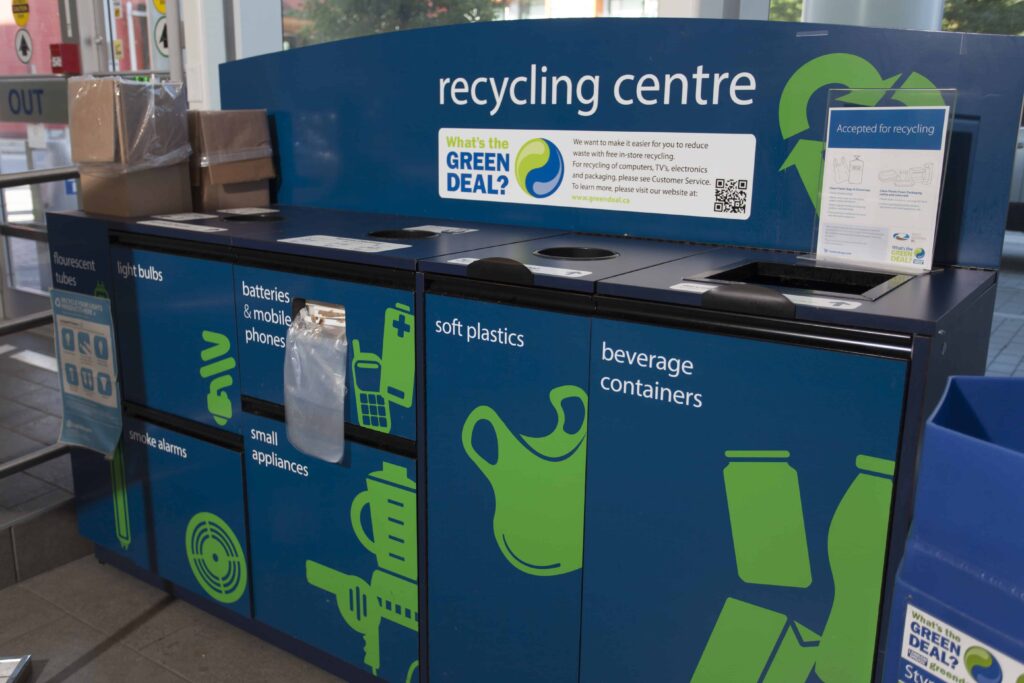A question we frequently receive from residents sounds something like “I used to live in [another community in Canada] and there we could recycle [material]. Why can’t I recycle it here?
The Multi-Material BC (MMBC) residential packaging and printed paper recycling program is the result of the provincial Recycling Regulation. The regulation specifies that producers of packaging and printed paper—the retailers, manufacturers, and other organizations that sell or give packaging and printed paper to BC residents—are responsible for managing the end of life of these materials when residents are finished with them. These organizations pay fees to MMBC to finance recycling programs on their behalf. The Recycling Regulation refers to packaging and printed paper, so the MMBC program only accepts packaging and printed paper. This means that materials that are sold as products (an easy way to tell is to consider whether the item is sold without any contents, such as garbage bags), are not accepted.
Because of the way the program is structured, materials accepted in the MMBC program are accepted in every community that participates in the program. When the program launched in 2014, some of these communities saw changes to what they can recycle, including adding coffee cups, aerosol containers, plastic plant pots, and more to their recycling (for a full list of materials, visit http://recyclinginbc.ca/program/mmbc-materials-list/).
Some communities collected plastic bags at curbside or multi-family locations before joining the MMBC program. Now, residents who wish to recycle plastic bags and overwrap (retail shopping bags, bread bags, and overwrap from toilet paper and paper towels) can take these materials to a depot. This is because when plastic bags are collected from the curb with other recyclables, they cannot be easily separated from the other materials at the sorting facility. We’ve written about how to recycle plastic bags before: http://recyclinginbc.ca/blog-post/.
Non-deposit glass bottles and jars, for products such as mayonnaise, oils, and vinegars, are best recycled by taking them to a depot; however, some communities offer curbside collection of glass in a segregated container so the glass is kept separate from other recyclables.
Foam packaging—polystyrene meat trays, egg cartons, take-out containers, and protective packaging for electronics—is also accepted at depots. When this packaging is collected with other materials, it breaks down and cannot be recycled properly. Other types of foam packaging (squishy foam) are not accepted. Read more here: http://recyclinginbc.ca/focus-on-materials-foam-packaging/.
Other materials, like stand-up pouches (commonly used for sugar and snacks) or other multi-layered plastic laminates are not accepted in curbside, multi-family, or depot collection because there is currently no process for recycling this packaging.
Items that frequently make their way into recycling collection containers require special handling and need to go to a depot as part of other collection programs. Electronics, appliances, batteries, are all examples of these. Finding your nearest depot is easy; visit http://www.bcrecycles.ca/ to start your search.
Residents may notice that they receive notifications from their collectors or materials are left behind on collection day, so it feels as though they are recycling less. Many of the items left behind (glass, plastic bags, foam packaging) or recyclables requiring special handling are only accepted at a depot, and the other materials are often stand-up pouches or hazardous containers. MMBC collectors are diligent about educating residents about what is accepted, and leaving a notice or leaving not-accepted items are ways that collectors can help spread the word to residents about what is accepted in the program. If you receive a note, please contact your recycling collector for more information.




